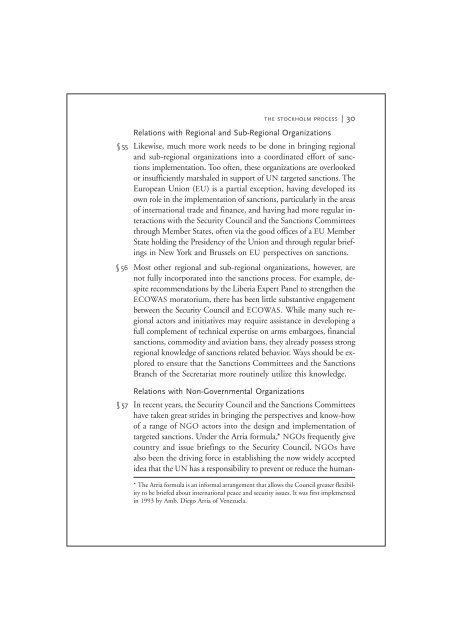Making Targeted Sanctions Effective - Small Arms Survey
Making Targeted Sanctions Effective - Small Arms Survey
Making Targeted Sanctions Effective - Small Arms Survey
You also want an ePaper? Increase the reach of your titles
YUMPU automatically turns print PDFs into web optimized ePapers that Google loves.
THE STOCKHOLM PROCESS | 30<br />
§ 55<br />
§ 56<br />
§ 57<br />
Relations with Regional and Sub-Regional Organizations<br />
Likewise, much more work needs to be done in bringing regional<br />
and sub-regional organizations into a coordinated effort of sanctions<br />
implementation. Too often, these organizations are overlooked<br />
or insufficiently marshaled in support of UN targeted sanctions. The<br />
European Union (EU) is a partial exception, having developed its<br />
own role in the implementation of sanctions, particularly in the areas<br />
of international trade and finance, and having had more regular interactions<br />
with the Security Council and the <strong>Sanctions</strong> Committees<br />
through Member States, often via the good offices of a EU Member<br />
State holding the Presidency of the Union and through regular briefings<br />
in New York and Brussels on EU perspectives on sanctions.<br />
Most other regional and sub-regional organizations, however, are<br />
not fully incorporated into the sanctions process. For example, despite<br />
recommendations by the Liberia Expert Panel to strengthen the<br />
ECOWAS moratorium, there has been little substantive engagement<br />
between the Security Council and ECOWAS. While many such regional<br />
actors and initiatives may require assistance in developing a<br />
full complement of technical expertise on arms embargoes, financial<br />
sanctions, commodity and aviation bans, they already possess strong<br />
regional knowledge of sanctions related behavior. Ways should be explored<br />
to ensure that the <strong>Sanctions</strong> Committees and the <strong>Sanctions</strong><br />
Branch of the Secretariat more routinely utilize this knowledge.<br />
Relations with Non-Governmental Organizations<br />
In recent years, the Security Council and the <strong>Sanctions</strong> Committees<br />
have taken great strides in bringing the perspectives and know-how<br />
of a range of NGO actors into the design and implementation of<br />
targeted sanctions. Under the Arria formula,* NGOs frequently give<br />
country and issue briefings to the Security Council. NGOs have<br />
also been the driving force in establishing the now widely accepted<br />
idea that the UN has a responsibility to prevent or reduce the human-<br />
* The Arria formula is an informal arrangement that allows the Council greater flexibility<br />
to be briefed about international peace and security issues. It was first implemented<br />
in 1993 by Amb. Diego Arria of Venezuela.
















